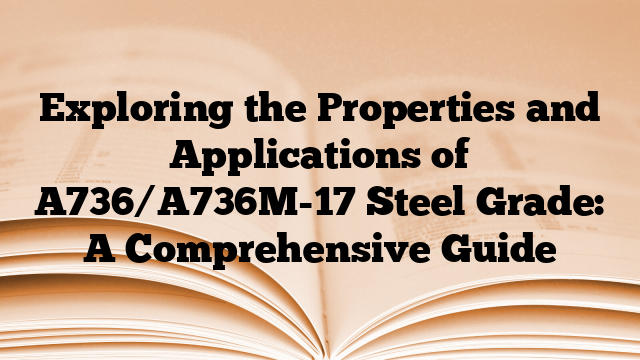ASTM A736/A736M-17 is a standard specification for pressure vessel plates, low-carbon age-hardening nickel-copper-chromium-molybdenum-columbium (niobium) alloy steel. This steel grade is primarily used in welded pressure vessels where improved notch toughness is required. It is suitable for service at low temperatures and provides excellent resistance to self-healing in seismic zones. This guide explores the properties and applications of A736/A736M-17 steel grade, providing a comprehensive overview for engineers and researchers.
The chemical composition of A736/A736M-17 steel grade plays a crucial role in determining its properties. The steel is composed of carbon, manganese, phosphorus, sulfur, silicon, nickel, chromium, molybdenum, and columbium. The carbon content is limited to 0.15%, while manganese, phosphorus, sulfur, and silicon contents are within specified ranges. Nickel, chromium, molybdenum, and columbium are added in varying percentages to enhance the steel’s strength, toughness, and resistance to corrosion.
The mechanical properties of A736/A736M-17 steel grade are important for determining its suitability for various applications. The standard specifies requirements for tensile strength, yield strength, elongation, and notch toughness. The steel must possess a specified minimum tensile strength and yield strength, ensuring it can withstand high-pressure environments. The elongation specifies how much the material can deform before it breaks, indicating its ductility. Notch toughness measures the material’s ability to resist the initiation and propagation of cracks, especially in areas of high-stress concentration.
A736/A736M-17 steel grade finds its applications primarily in the fabrication of welded pressure vessels. These vessels are commonly used in industries such as petrochemical, oil and gas, chemical processing, and power generation. The steel’s low carbon content improves its weldability, making it suitable for welding, fabrication, and repair processes. The addition of nickel, chromium, molybdenum, and columbium enhances the steel’s resistance to corrosion and provides improved mechanical properties at low temperatures.
The corresponding standard number for A736/A736M-17 steel grade is ASTM A736/A736M-17. This standard provides detailed specifications for the chemical composition, mechanical properties, heat treatment, dimensional tolerances, and testing requirements for the steel grade.
In conclusion, A736/A736M-17 steel grade is a low-carbon age-hardening alloy steel used in welded pressure vessels. It offers excellent notch toughness, resistance to self-healing in seismic zones, and corrosion resistance. The steel’s composition and mechanical properties make it suitable for various applications in the petrochemical, oil and gas, chemical processing, and power generation industries. ASTM A736/A736M-17 standard outlines the specifications for this steel grade, ensuring consistency and reliability in its application.

